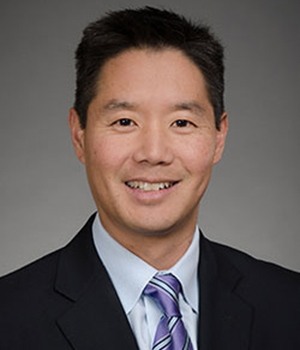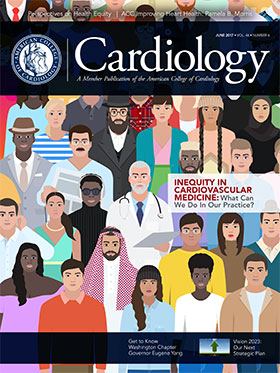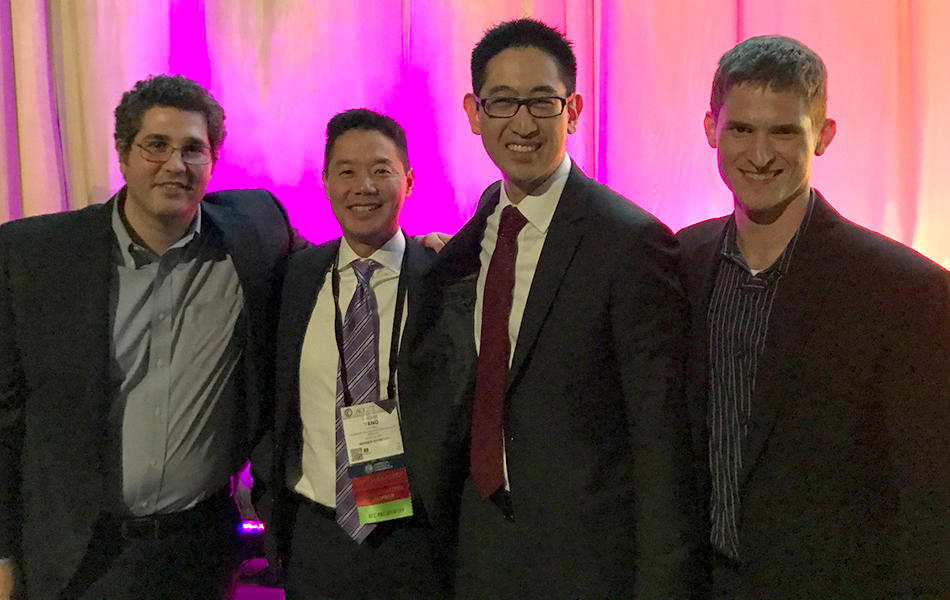Eugene Yang, MD, FACC: An Activist for Patient Access Making a Difference in the Evergreen State

Eugene Yang, MD, FACC, governor of ACC's Washington Chapter, always had an interest in medicine. He volunteered at a local hospital during high school and pursued promising research in college and graduate school. He went to medical school thinking surgery was his calling, but became fascinated by cardiovascular pathophysiology and the rest is history. His rise to leadership at the ACC was born from a single moment when he contacted his local ACC chapter for help with getting prior authorization for a patient. What started as a call to help one patient subsequently turned into a position on the Washington Chapter's Payer Advocacy Committee advocating on behalf of all patients in the state. Now as governor, Yang hopes to make an even bigger difference at both a state and national level. Cardiology spoke with Yang about his journey to governor and what he hopes to leave as his legacy.
How did you decide to become a cardiologist?
I always had an interest in medicine growing up. However, in college, I did a lot of research and had some success with early discoveries that made me question if I was interested in science and scientific discovery or medicine. It was while I was in graduate school at Stanford pursuing a PhD in neuroscience that I realized I was not fulfilled by just doing research. I think I was missing the human side of medicine and direct patient care. I did some rotations in the hospital that further galvanized this feeling. This was a major turning point in my career and made me decide to attend medical school.
When I went to medical school I thought I’d become an orthopedic surgeon or other type of surgical specialist. I was focused on “fixing things” and having a definitive therapeutic outcome for my patients. It was during my second year that cardiology caught my attention. My cardiovascular pathophysiology course changed my perception of what I thought I was going to do. I was intrigued by the complexity of the heart and all the knowledge that was required to understand this system. When it came time to look for internal medicine residency programs, I only applied to those that also had strong cardiology training.
I did my cardiology fellowship at Stanford where my research focused on understanding the genetic basis of atherosclerosis through use of high-throughput genomic technologies. I moved into translational research and worked on developing animal models to image vulnerable atherosclerotic plaques. I realized during this time that I was not committed enough to be a physician-scientist, so I moved to the University of Washington (UW) to concentrate on clinical care, something I missed during my research career.
Today, as a general cardiologist, my very busy UW Medicine practice focuses on primary and secondary prevention of heart disease. I take care of pretty much everything – hypertension, heart failure, lipids, atrial fibrillation, etc. I still love research and have developed an interest in clinical research and been a principal investigator or co-investigator for several trials, including optimal management of patients with stable ischemic heart disease (ISCHEMIA) and hyperlipidemia outcomes studies (FOURIER).
Who are your biggest mentors?
There are several people who I have looked up to during my career. Deepak L. Bhatt, MD, MPH, FACC, at Harvard, was my resident at Penn when I was a medical student. He is one of the smartest people I have ever known and, while he might not know it, is one of the reasons I became a cardiologist. We have remained in touch and I have sought advice from him over the years. He is someone I look up to who has built an exemplary career as a clinician, researcher and educator – the ultimate “triple threat.”
Thomas Quertermous, MD, chief of cardiovascular research at Stanford, was my research advisor and first true mentor. His passion for scientific discovery was inspiring. He helped me to recognize the importance of pursuing a career that was of interest to me. I would not have made the career change from physician scientist to clinician without his advice. Richard L. Page, MD, FACC, the previous chief of cardiology at the University of Washington, has been another excellent role model. He was superb at recognizing the value of strengthening relationships with referring providers and building a good reputation in the medical community. He taught me the importance of customer service for patients and providers. I incorporate much of what I learned from him into my clinical practice, including giving patients and providers my personal cell phone number so they can reach me any time.
Finally, my most influential mentor is my father. He grew up in a small town in Korea and from there became a political science professor in Kentucky where I grew up. He later returned to Korea where he was elected to the Korean parliament and was then appointed Korean Ambassador to the United States. He is one of the hardest working, most driven people I have ever known. He has devoted most of his life to unifying the Korean peninsula. As for my own legacy, I hope I have a few decades to figure this out.
How did you become involved with the ACC?
Even though I attended the ACC’s Annual Scientific Session each year, I was not actively involved with the ACC until about three years ago when a single event changed everything. One of my patients who bought health insurance through the health exchange program needed a blood thinner for her atrial fibrillation. As a human rights activist with a busy travel schedule, warfarin wasn’t compatible with her lifestyle. I recommended a direct oral anticoagulant (DOAC) that was immediately rejected by her insurance company, despite the fact that she paid nearly $25,000 annually in premiums and the medication met ACC’s appropriate use criteria (AUC). After spending hours on the phone and writing multiple appeals to her insurance company, she received approval for the DOAC several months later.
This experience left me feeling that I had no way to advocate for my patients just to have access to a first-line medication. I knew then-governor of ACC’s Washington Chapter, Timothy A. Dewhurst, MD, FACC, so I emailed him saying I was upset about the issue of prior authorization and asking what I could do about it. He emailed back thanking me for my letter and encouraging me to get involved by chairing the chapter’s Payer Advisory Committee. My experience on the committee and watching Tim do such a fantastic job energizing the Washington Chapter with his enthusiasm and commitment made me want to get more involved with the ACC both at the state level and nationally.
What are some of your plans for the Washington Chapter as its new governor?
My main priority is to increase member involvement in the chapter. I plan to travel to and meet with members across the state. I especially want to visit smaller practices and hospitals and get input from members on how we can generate more interest and offer real value. Second, I am working to increase our cardiovascular (CV) team membership. We have a great new CV Team liaison to guide us, who is already making inroads with a variety of groups including CV technologists and ultrasonographers. Finding ways to capture the interests of Fellows in Training (FITs) and foster strong relationships that last beyond their fellowships into their careers as practicing cardiologists is another goal.
Of course, prior authorization continues to be a passion of mine. I want to work with ACC’s national leadership to make sure we (the states) have access to the information we need to successfully address prior authorization challenges with insurance companies at the state and national level.
Why do you think it’s important for members to be involved in the ACC?
I think the ACC is vital when it comes to representing the needs of CV team members and cardiologists. The ACC focuses on optimization of cardiology care through development of guidelines, research program support, scientific publications, and regulatory and legislative activities. It has been the main advocacy group for our clinical practices around major issues like maintenance of certification, AUC for advanced cardiac imaging requests and participation requirements under the Quality Payment Program created under the Medicare Access and CHIP Reauthorization Act (MACRA).
How do you see the College impacting prior authorization at the state and national level?
If we are going to be successful at getting payers at the state and national level to reduce the burden of prior authorization, we need to be able to collect data showing that cardiologists adhere to guidelines and treat patients appropriately when making decisions about medications, therapies and procedures. We need to show the burden of prior authorization on our limited resources and that the frequency of inappropriate testing is low. The ACC has developed a Prior Authorization Reporting Tool (PARTool) that can help with data collection and hopefully support our efforts at the state and national level to address prior authorization issues – and potentially persuade payers and state insurance commissioners to minimize, or even eliminate, some of their prior authorization requirements.
 |
|
| Click the cover image above to read the latest issue of Cardiology in e-pub format or click here to read it on the web! | |
Clinical Topics: Anticoagulation Management, Arrhythmias and Clinical EP, Cardiovascular Care Team, Dyslipidemia, Heart Failure and Cardiomyopathies, Prevention, Atherosclerotic Disease (CAD/PAD), Anticoagulation Management and Atrial Fibrillation, Genetic Arrhythmic Conditions, Atrial Fibrillation/Supraventricular Arrhythmias, Lipid Metabolism, Acute Heart Failure, Hypertension
Keywords: ACC Publications, Cardiology Magazine, Anticoagulants, Atherosclerosis, Atrial Fibrillation, Certification, Coronary Artery Disease, Fellowships and Scholarships, Genomics, Heart Failure, Hyperlipidemias, Hypertension, Internship and Residency, Life Style, Lipids, Medicare, Mentors, Neurosciences, Patient Care, Plaque, Atherosclerotic, Republic of Korea, Research Personnel, Secondary Prevention, Translational Medical Research
< Back to Listings


 Eugene Yang, MD, FACC, governor of ACC’s Washington Chapter (second from left), with members of his chapter’s FIT Jeopardy team at ACC.17.
Eugene Yang, MD, FACC, governor of ACC’s Washington Chapter (second from left), with members of his chapter’s FIT Jeopardy team at ACC.17.
 Eugene Yang, MD, FACC, (fourth from left), at the ACC convocation with members of the BOG and BOT.
Eugene Yang, MD, FACC, (fourth from left), at the ACC convocation with members of the BOG and BOT.
